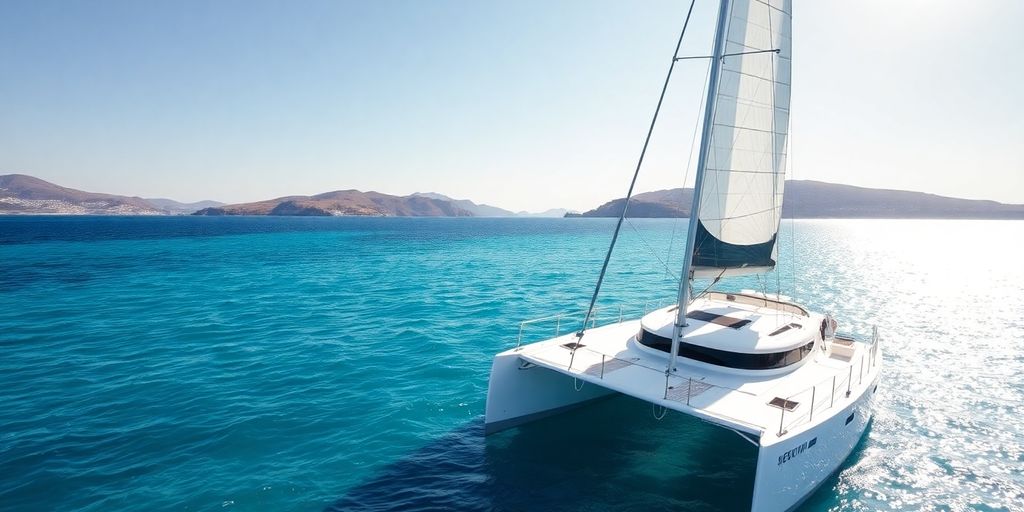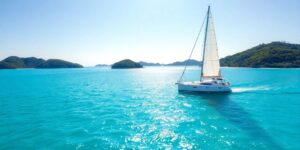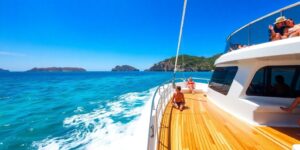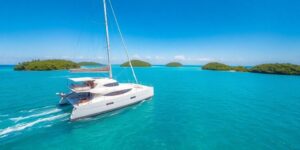Picture this: clear blue water, ancient ruins, and charming villages, all from the deck of your own private boat. A catamaran charter in Greece is a fantastic way to see the islands, offering a mix of adventure and relaxation. It’s a trip that can be perfect for anyone, whether you’re new to sailing or looking for a fresh way to explore. This guide will walk you through everything you need to know to plan your ultimate Greek island hopping experience.
Key Takeaways
- Greece is an amazing place for a catamaran charter because it has so many islands to visit and beautiful waters.
- You can pick between a skippered charter (where someone else drives the boat) or a bareboat charter (you drive it yourself) depending on your experience.
- Planning your route involves picking popular areas and finding hidden spots, making each day special.
- Understanding all the costs, from the boat rental to food and other fees, helps you stay on budget.
- Packing smart and getting your boat ready with supplies will make your trip much smoother and more fun.
Why Choose Greece for Your Catamaran Charter?

Greece is a super popular spot for sailing, and for good reason. With thousands of islands, clear water, and a mix of chill time and adventure, it’s a great place to rent a catamaran. You can easily hop from island to island, soak up the sun, and explore ancient ruins. Plus, the food is amazing!
Unrivaled Island Hopping Opportunities
Greece has so many islands, it’s hard to pick where to go! That’s what makes it perfect for a catamaran trip. You can visit a bunch of different islands in one trip, each with its own vibe. One day you’re checking out ancient ruins, the next you’re chilling on a beach. It’s like a choose-your-own-adventure, but on the water.
- The Cyclades: Famous for their white buildings and blue domes.
- The Ionian Islands: Known for their green landscapes and calm waters.
- The Dodecanese: A mix of history and beaches, close to Turkey.
The Allure of Turquoise Waters
The water around Greece is seriously beautiful. It’s that clear, blue-green color you see in pictures, and it’s even better in person. Swimming, snorkeling, and just looking at the water are all great ways to spend your time. Plus, a family catamaran holiday in Greece is a great way to experience the water.
- The water is super clear, so you can see everything.
- It’s warm enough to swim in for most of the year.
- There are tons of hidden coves and beaches to explore.
Imagine waking up, jumping into crystal-clear water for a swim, and then having breakfast on the deck of your catamaran. That’s a typical day in Greece.
A Perfect Blend of Relaxation and Adventure
Greece is a great mix of relaxing and doing fun stuff. You can spend your days sailing, swimming, and sunbathing, or you can explore ancient sites, hike in the mountains, and try new foods. There’s something for everyone, and you can do as much or as little as you want. A catamaran charter for beginners is a great way to experience this.
- Relax on the deck and soak up the sun.
- Explore ancient ruins and learn about Greek history.
- Try water sports like snorkeling, paddleboarding, and windsurfing.
| Activity | Description |
|---|---|
| Sailing | Explore the islands by sea. |
| Swimming | Enjoy the clear, turquoise waters. |
| Sightseeing | Visit ancient ruins and historical sites. |
Selecting the Ideal Catamaran and Crew
Choosing the right catamaran and crew can really make or break your Greek sailing adventure. It’s not just about picking a boat; it’s about creating an experience that matches your needs and expectations. Let’s dive into the key considerations to help you make the best choice.
Skippered Versus Bareboat Catamaran Charters
This is the first big decision. Do you want to sail the catamaran yourself (bareboat), or would you prefer to have a skipper handle the sailing? For first-timers, a skippered charter is almost always the better option. Unless you have extensive sailing experience and the proper certifications, navigating the Greek islands can be tricky. A skipper knows the waters, the best anchorages, and can handle any unexpected situations that might arise.
Here’s a quick comparison:
| Feature | Skippered Charter | Bareboat Charter |
|---|---|---|
| Sailing Skill | Not Required | Required (certification and experience) |
| Responsibility | Relax and enjoy | Full responsibility for the boat and crew |
| Local Knowledge | Skipper provides valuable insights | Requires extensive pre-planning and research |
| Cost | Generally higher (skipper fee) | Potentially lower (no skipper fee) |
| Flexibility | Can adjust itinerary based on skipper’s advice | More rigid itinerary based on your own planning |
The Benefits of a Professional Crew
Beyond just a skipper, you might consider adding other crew members to your charter. A hostess or cook can take care of meals and cleaning, allowing you to fully relax and enjoy your vacation. This is especially appealing for families or larger groups where dividing up chores can be a hassle. Think about it: no grocery shopping, no cooking, no dishwashing – just pure relaxation. A professional crew can also enhance your experience by providing local insights and recommendations that you might not find in a guidebook. When selecting your perfect catamaran, consider the crew options available and how they align with your desired level of service.
Essential Features for Your Catamaran Charter
Catamarans come in all shapes and sizes, with varying features and amenities. Before you book, think about what’s important to you. Do you need air conditioning? A generator? Water maker? How many cabins do you need? Consider these points:
- Size and Layout: Choose a catamaran that comfortably accommodates your group. A 40-foot catamaran is good for 6-8 people, while a larger one offers more space. Think about the cabin layout and if you need a master suite.
- Amenities: Air conditioning is a must-have during the hot summer months. A generator provides power for appliances and electronics. A water maker is useful for longer trips.
- Water Toys: Many catamarans come equipped with water toys like kayaks, paddleboards, or snorkeling gear. These can add a lot of fun to your trip. Make sure to check what’s included. Also, confirm the safety gear is adequate for everyone on board.
It’s important to communicate your needs and preferences to the charter company. Don’t be afraid to ask questions and clarify any doubts before you book. A reputable company will be happy to help you find the perfect catamaran and crew for your dream Greek sailing adventure. They can also help you understand the factors influencing catamaran charter pricing so you can budget accordingly.
Crafting Your Dream Catamaran Itinerary
Popular Sailing Regions for Catamaran Charters
Greece is a sailor’s playground, but some areas are just chef’s kiss for catamaran charters. The Ionian Islands, with their calm waters and lush landscapes, are great for beginners. The Cyclades, on the other hand, offer that classic Greek island vibe with whitewashed villages and bluer-than-blue seas, but can have stronger winds. The Dodecanese are a bit further out, offering a mix of history and stunning beaches. Each region has its own charm, so think about what kind of experience you’re after. Do you want easy sailing and sheltered bays, or are you up for a bit more adventure?
Designing a Flexible 7-Day Catamaran Adventure
Flexibility is key when planning your catamaran trip. Weather can change, and you might find a hidden cove you just have to explore for an extra day. Here’s a sample itinerary, but remember to keep it loose:
- Day 1: Arrive in Athens, board your catamaran, and settle in.
- Day 2: Sail to Aegina, explore the ancient temple, and enjoy the local pistachios.
- Day 3: Head to Hydra, a car-free island with charming harbor towns.
- Day 4: Cruise to Spetses, known for its elegant mansions and pine forests.
- Day 5: Discover Poros, with its vibrant nightlife and picturesque waterfront.
- Day 6: Relax in a secluded bay on the way back to Athens.
- Day 7: Disembark in Athens, filled with memories.
Remember, this is just a suggestion. Talk to your skipper (if you have one) about your interests and let them tailor the route to your preferences. The goal is to have a relaxing and unforgettable experience.
Discovering Hidden Gems and Local Experiences
Forget the crowded tourist spots! The real magic of a catamaran charter is finding those out-of-the-way places that most people miss. Ask locals for recommendations – they always know the best tavernas and secluded beaches.
Here are some ideas:
- Snorkel in crystal-clear waters away from the main beaches.
- Visit a small, family-run winery for a tasting.
- Attend a local festival or celebration.
- Learn a few basic Greek phrases to connect with the locals.
Don’t be afraid to venture off the beaten path. Some of the best memories are made when you least expect them. Embrace the spontaneity and let the Greek islands surprise you!
Understanding the Costs of a Catamaran Charter in Greece
Factors Influencing Catamaran Charter Pricing
So, you’re dreaming of sailing around the Greek islands on a catamaran? Awesome! But before you start packing your bags, let’s talk about the money side of things. The price of a catamaran rental can vary quite a bit, and it’s good to know what affects it.
- Size and Age of the Catamaran: Bigger and newer catamarans usually cost more. Makes sense, right? Think of it like renting a car – a brand-new SUV will be pricier than an older compact car.
- Season: Just like hotels, charter prices go up during peak season (usually summer) and down during the shoulder seasons (spring and fall). If you’re flexible with your dates, you can save some serious cash by traveling outside of July and August.
- Charter Type (Bareboat vs. Skippered/Crewed): A bareboat charter, where you’re responsible for sailing the boat yourself, is generally cheaper than a skippered or crewed charter. But remember, with a bareboat, you’ll also need to factor in the cost of food and other supplies.
- Duration: The longer you charter the catamaran, the more it will cost, but you might get a better daily rate for longer charters.
Budgeting for Onboard and Ashore Expenses
Okay, you’ve got the base charter price figured out. Now, let’s talk about all the extras. This is where things can add up quickly if you’re not careful. Here’s a breakdown of what you need to consider:
- Food and Drinks: You’ll need to buy groceries for meals on board. You can either do this yourself or have the charter company provision the boat for you (for an extra fee, of course). Don’t forget drinks, too – water, soda, beer, wine… whatever floats your boat!
- Fuel: Catamarans use fuel, especially if you’re motoring a lot. The cost of fuel will depend on how much you sail versus motor, and the size of the catamaran’s engine.
- Mooring Fees: Some harbors and marinas charge mooring fees. These can range from a few euros to quite a bit more, depending on the location and the time of year. Smaller harbors are often cheaper (or even free!).
- Entertainment: Factor in costs for activities like watersports, excursions, and dining at restaurants ashore. Eating at local tavernas is a must-do in Greece, but it can add up if you’re not careful.
It’s easy to get caught up in the excitement of planning your trip and forget about the little things. Make a detailed budget and stick to it as much as possible. It’s better to overestimate your expenses than to run out of money halfway through your trip.
Navigating Additional Fees and Insurance
Almost there! Just a few more things to keep in mind when it comes to costs. These are the things that often get overlooked but can make a big difference in your final bill.
- Security Deposit: You’ll usually need to pay a security deposit before you set sail. This covers any damage to the catamaran during your charter. If you return the boat in good condition, you’ll get the deposit back.
- End Cleaning Fee: Some charter companies charge an end cleaning fee to clean the boat after your charter. Check your contract to see if this is included in the base price.
- APA (Advance Provisioning Allowance): If you’re chartering a crewed catamaran, you’ll likely need to pay an APA. This is a lump sum of money that covers expenses like fuel, food, drinks, and port fees. The crew will keep track of the expenses and refund any unused money at the end of the charter.
- Travel Insurance: It’s always a good idea to get travel insurance that covers trip cancellations, medical emergencies, and other unforeseen events. Some policies also cover damage to the catamaran.
- Crew Gratuities: If you have a skipper and/or crew, it’s customary to tip them at the end of the charter. A typical tip is around 5-15% of the charter price, depending on the level of service. Don’t forget food and drink for the crew too!
By understanding all these costs, you can plan your dream catamaran charter in Greece without any financial surprises. Happy sailing!
Preparing for Your Catamaran Charter Adventure
Packing Essentials for Your Greek Sailing Trip
Okay, so you’re getting ready for your Greek catamaran adventure! Packing is key. Space is limited on board, so you really want to think about what you need versus what you want. The goal is to pack light but smart.
Here’s a quick rundown:
- Clothing: Think layers. Even in summer, evenings can get cool. Pack light, quick-drying clothes. Swimsuits are a must, of course! Don’t forget a good raincoat or windbreaker, and maybe some lightweight, water-resistant pants. A couple of warmer outer layers are also a good idea.
- Footwear: Soft-soled shoes are a must to avoid damaging the deck. Flip-flops or sandals are great for on shore. Consider water shoes for rocky beaches.
- Sun Protection: Sunglasses, sunscreen (reef-safe is best!), and a hat are non-negotiable. The Greek sun is intense!
- Toiletries: Bring travel-sized toiletries to save space. Consider biodegradable options.
- Medications: Pack any prescription medications you need, plus some basic over-the-counter remedies like pain relievers, motion sickness pills, and antiseptic wipes.
- Documents: Passport, visa (if required), driver’s license, and copies of your charter agreement. Keep digital copies stored securely online.
Don’t overpack shoes! They take up a ton of space. Also, leave your valuables at home. You won’t need fancy jewelry on a boat.
Provisioning Your Catamaran for the Journey
Provisioning is basically stocking up on food and drinks for your trip. You have a few options here. You can pre-order provisions through the charter company, shop at local markets yourself, or a combination of both. Pre-ordering is convenient, but shopping locally lets you experience Greek culture and find fresh, regional products.
Things to consider:
- Meal Planning: Plan out your meals for the week. This will help you create a shopping list and avoid overbuying.
- Dietary Needs: If anyone in your group has dietary restrictions or allergies, make sure to communicate this to the charter company or when shopping.
- Drinks: Water is essential! Also, stock up on your favorite beverages, like juice, soda, beer, or wine. Remember to drink responsibly.
- Snacks: Pack plenty of snacks for those in-between meal cravings. Fruit, nuts, granola bars, and crackers are all good options.
- Local Specialties: Don’t be afraid to try local Greek products! Olives, feta cheese, honey, and fresh bread are all delicious.
| Item | Quantity (per person per day) | Notes |
|---|---|---|
| Water | 2 liters | Essential for hydration |
| Snacks | 2-3 items | Granola bars, fruit, nuts |
| Breakfast Items | 1 serving | Cereal, yogurt, bread, jam |
| Lunch Items | 1 serving | Sandwiches, salads, leftovers |
| Dinner Items | 1 serving | Pasta, grilled meats, seafood |
Safety Tips for First-Time Catamaran Charterers
Safety first! Before you even step foot on the catamaran, familiarize yourself with some basic safety procedures. Knowing what to do in an emergency can make all the difference.
Here are some tips:
- Attend the safety briefing: The charter company will provide a briefing on the boat’s systems, safety equipment, and emergency procedures. Pay close attention and ask questions if anything is unclear.
- Locate safety equipment: Know where the life jackets, flares, first-aid kit, and fire extinguishers are located.
- Learn basic sailing terms: Understanding basic sailing terminology will help you communicate with the skipper and crew.
- Be aware of weather conditions: Check the weather forecast regularly and be prepared for changes in conditions.
- Wear appropriate clothing: Dress in layers and wear non-slip shoes.
- Stay hydrated: Drink plenty of water, especially in hot weather.
- Use sunscreen: Protect yourself from the sun’s harmful rays.
- Be careful when moving around the boat: The deck can be slippery, especially when wet. Use handrails and watch your step.
- Don’t overload the boat: Make sure the boat is not overloaded with passengers or cargo.
- Know your limits: Don’t attempt to do anything beyond your capabilities. If you’re not comfortable with something, ask for help.
Always wear a life jacket when sailing in rough weather or at night. Also, be aware of the location of the catamaran charter company’s emergency contact information.
Life Onboard Your Catamaran Charter

Daily Routines and Activities at Sea
Life on a catamaran is pretty sweet. Mornings often start with coffee on deck, watching the sunrise paint the sky. Days are filled with short sails between islands, giving you plenty of time to swim in crystal-clear waters and snorkel around hidden coves. Lunch might be a simple affair onboard, or a visit to a charming taverna on shore. Evenings? Think stunning sunsets, maybe a cocktail or two, and the gentle rocking of the boat as you drift off to sleep. It’s a rhythm that quickly becomes addictive. A typical day might look like this:
- Wake up to the sunrise and enjoy a leisurely breakfast.
- Sail to a new island or secluded bay.
- Swim, snorkel, or explore the coastline.
- Enjoy lunch onboard or at a local restaurant.
- Relax on deck, read a book, or soak up the sun.
- Watch the sunset and enjoy dinner under the stars.
The best part about being on a catamaran is the freedom. You’re not tied to a strict schedule, and you can change your plans on a whim. If you find a beach you love, you can stay there all day. If you want to try a new restaurant, you can sail to the nearest port. It’s all up to you.
Enjoying Water Sports and Onboard Amenities
Catamarans are basically floating playgrounds. Most come equipped with snorkeling gear, and many offer extras like paddleboards or kayaks. Zipping around on a dinghy to explore hidden beaches is always a blast. And when you’re not in the water, there’s plenty of space to relax on deck, soak up the sun, or read a book in the shade. Some catamarans even have features like onboard WiFi, a BBQ grill, or a sound system. Make sure to check the catamaran rental fleet for the amenities that are important to you.
Here’s a quick rundown of common onboard amenities:
- Snorkeling gear
- Paddleboards or kayaks (often optional)
- Dinghy with outboard motor
- BBQ grill
- Sound system
Dining Experiences: From Tavernas to Sunset Meals
Food is a huge part of the Greek experience, and being on a catamaran gives you the best of both worlds. You can stock up on local ingredients and prepare meals in the fully equipped kitchen, or you can hop ashore and sample the delights of the local tavernas. Imagine grilling fresh fish on the BBQ as the sun sets, or enjoying a traditional Greek feast at a waterfront restaurant. It’s all about options. Consider booking your catamaran charter today!
Here’s a comparison of dining options:
| Option | Pros | Cons |
|---|---|---|
| Onboard Meals | Cost-effective, convenient, customizable | Requires cooking and cleaning |
| Taverna Dining | Authentic Greek cuisine, social atmosphere | Can be more expensive, may require travel to shore |
| Sunset BBQ | Romantic, delicious, memorable | Requires planning and preparation |
Your Greek Catamaran Dream Awaits!
So, there you have it. A catamaran trip in Greece isn’t just a vacation; it’s an experience you won’t forget. Imagine waking up to the sun on your face, the sound of waves, and a new island waiting to be explored every day. It’s a pretty special way to see Greece, especially for families or anyone new to sailing. You get to relax, see amazing places, and make memories that stick with you. If you’ve been thinking about it, now’s the time to start planning. Your floating adventure is out there, just waiting for you to set sail.
Frequently Asked Questions
What exactly is a catamaran?
A catamaran is like a floating home with two hulls, making it super stable and roomy. It’s perfect for a chill vacation because it doesn’t rock much, has lots of space to hang out, and lets you get close to shallow beaches. Think of it as a comfy apartment that can sail anywhere!
Why is Greece a great place for a catamaran charter?
Greece is amazing for catamaran trips because it has tons of islands close to each other, calm blue waters, and lots of sunny days. You can easily hop from one island to the next, find quiet coves, and enjoy both relaxing and fun activities.
Should I choose a 'skippered' or 'bareboat' charter?
If you’re new to sailing, a ‘skippered’ charter is best. This means a professional captain sails the boat for you, so you don’t have to worry about navigating. They also know all the best spots! If you have sailing experience and the right licenses, you can choose a ‘bareboat’ charter and sail it yourself.
What's a typical day like on a catamaran charter?
A typical week on a catamaran in Greece is a mix of sailing, swimming, and exploring. You’ll wake up in new bays, enjoy water sports, visit charming villages, and eat delicious Greek food. It’s like a floating adventure where your hotel moves with you!
How much does a catamaran charter in Greece usually cost?
The cost changes based on the boat’s size, how fancy it is, and when you go (peak season is more expensive). You’ll also need to plan for food, fuel, and docking fees. Some charters include a crew, which costs more but offers a very relaxed trip.
What should I pack and how do I get food for the trip?
Pack light, comfy clothes, swimsuits, sunscreen, and a hat. Don’t forget your camera! For food, you can buy groceries before you leave or stop at local markets on the islands. Your charter company can also help you with provisioning.



